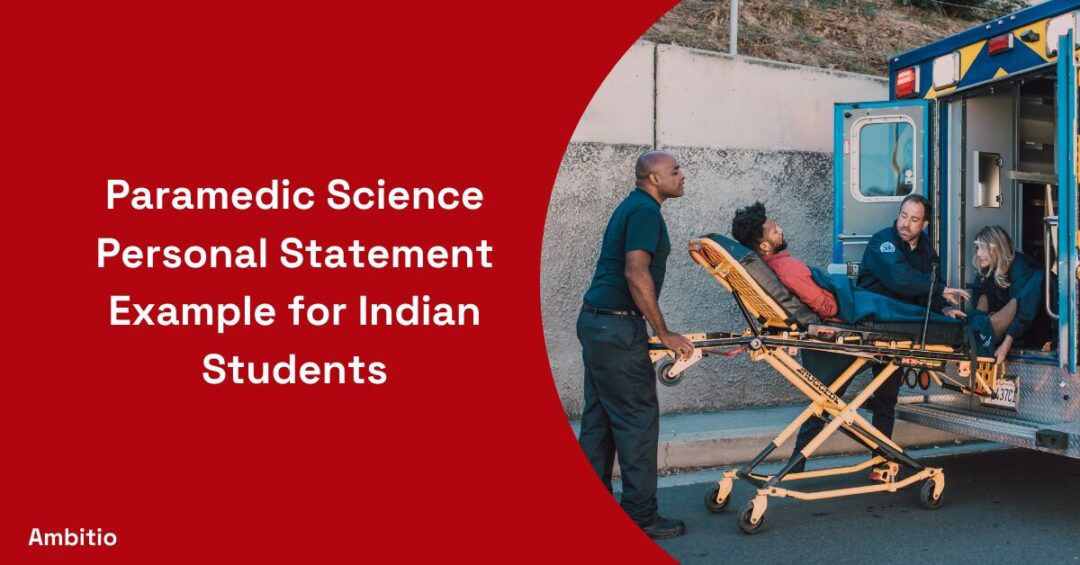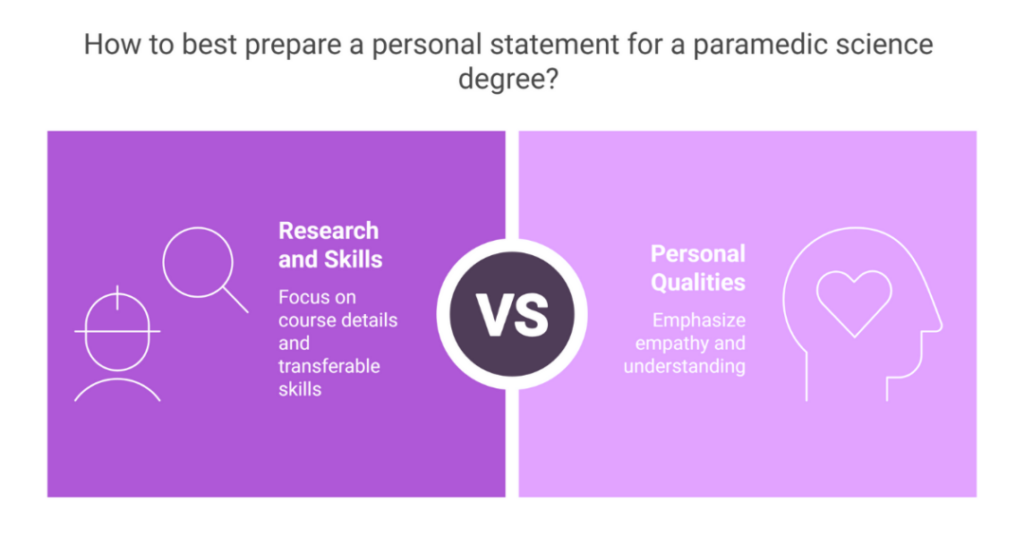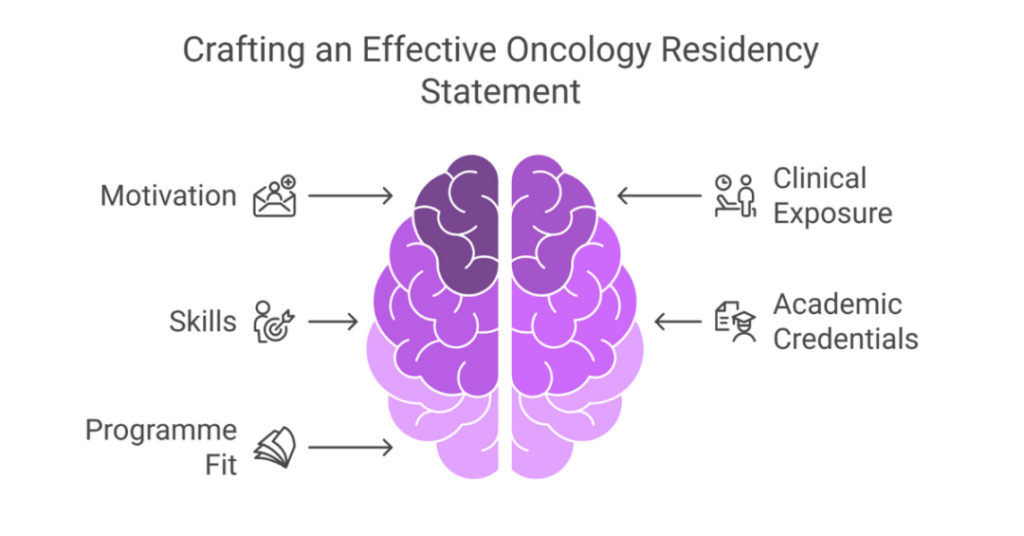16 May 2025
6 minutes read
Paramedic Science Personal Statement Example for Indian Students

Key Takeaways
- Paramedic science personal statement must highlight your practical skills, work experience, and desire to treat people in emergency situations.
- Paramedic science personal statement for Indian students should connect academic background with HCPC registration and NHS expectations.
- Paramedic science personal statement improves with personal experiences like volunteering, shadowing, and strong communication skills.
Paramedic science has a special attraction for students who appreciate hands-on experience and quick decision-making in actual situations. Indian students studying this field are attracted to the prospect of first-hand action and substantial healthcare provision.
This personal statement template is designed to offer a captivating and personalized framework for writing effective UCAS applications.
It explores the subtleties of crafting an effective paramedic science statement, providing examples, advice, and a guide on how to convert your own experiences and goals into an exceptional application.
With a growing need for competent paramedics within the NHS and global health sectors, now is the ideal moment to join this impactful profession.
We also highlight what top UK universities expect, how to align your communication skills and leadership qualities with course requirements, and why Indian students are increasingly choosing this profession.
What is a Paramedic Science Personal Statement?
Fun fact: A paramedic can administer more than 30 types of medications even before the patient reaches the hospital.
A paramedic science personal statement is a tailored document you submit with your UCAS application when applying for a paramedic science course. It explains why you want to become a paramedic and why you’re a good fit.

Here are the essentials:
- Answers why you want to study paramedic science.
- Reflects your work experience, such as volunteering with St John Ambulance or in a care home.
- Highlights your communication skills and quick thinking under stress.
- Shows awareness of the role of a paramedic within the NHS and emergency services.
- Links your academic background (maths, science, BTEC or diploma) with the programme’s entry requirements.
How to Write a Personal Statement for Paramedic Science Degree?
Did you know? Paramedics in the UK must register with the Health and Care Professions Council (HCPC) to practise legally.
Your personal statement is your chance to prove you’re prepared to become a paramedic. It needs to be honest, reflective, and detailed enough to show your readiness.
Key tips include:
- Start by researching the course and university life at top universities like University of Surrey or University of Hertfordshire.
- Mention transferable skills from work placements or part-time jobs, such as being a care assistant.
- Include personal experiences that show you can treat people from a wide range of backgrounds with empathy.
- Show understanding of pre-hospital care, medical knowledge, and emergency response.
- Write with passion but keep it structured within the UCAS character count (4,000 characters).
Comparison Table: Dos and Don’ts:
| Aspect | Dos | Don’ts |
|---|---|---|
| Tone | Professional, personal, and reflective | Too casual or exaggerated |
| Experience | Mention voluntary work at ambulance agencies | Fabricate or exaggerate experiences |
| Skills | Emphasise leadership, quick thinking, and teamwork | Avoid being vague or listing skills without proof |
| Structure | Clear introduction, body, and conclusion | Disorganised or too focused on one experience |
| Relevance | Tailor to paramedic science course and N.H.S expectations | Write generically as for any healthcare course |
Paramedical Science Personal Statement Example
Fun fact: The UK has over 30 air ambulance services operating as charity-funded initiatives.
Personal Statement Example
My name is Aditya Sharma, and I have always been captivated by the fast-paced nature of emergency medical services. A moment that solidified my desire to pursue paramedic science happened during my time volunteering for St John Ambulance in Delhi.
I witnessed the professionalism, compassion, and quick thinking of trained paramedics during a large public event where multiple people suffered heat strokes. Their ability to stay calm, provide care, and work as a team in the face of chaos inspired me deeply.
My academic background includes a BTEC in Health and Social Care with distinction and A-levels in Biology and Math. These subjects and grades provided me with a solid understanding of human anatomy and numerical reasoning, both essential for a paramedic role.
More importantly, they sharpened my logical thinking and practical skills. I understand the importance of medical knowledge, but also the ability to work under large amounts of stress.
I had the opportunity to represent paramedics during a two-week programme arranged by my school. I joined NHS ambulance services in Birmingham through a student exchange initiative. I saw how paramedics treat people across age groups and cultural backgrounds.
Whether assisting elderly dementia patients or responding to road traffic accidents, the professionalism and care delivered left a lasting impression on me.
Aside from academics, I have consistently worked as a volunteer in a care home for over a year. This part-time job gave me firsthand experience with vulnerable populations. I learned the value of patience, empathy, and the need for effective skills of communication.
These experiences also helped me develop leadership skills, especially when managing group activities or assisting in medical routines.
Open days at the University of Brighton and University of West London gave me valuable insight into what university life and the paramedic science course entail. Speaking with current students and faculty helped me realise how rigorous and rewarding the course is.
The emphasis on teamwork, practical training in emergency departments, and the path to becoming eligible to register with the Health and Care Professions Council (HCPC) align with my career goals.
I have also participated in several first aid workshops, earning certifications that reflect my commitment to learning. I recently completed an IELTS exam, scoring an overall band of 8.0, and I plan to appear for the ACT as part of my wider university applications.
I believe that my dedication to this field, along with my academic qualifications and practical exposure, make me a suitable candidate.
Ultimately, I want to become a paramedic because I want to be part of a team that delivers life-saving care at the time of need. This profession allows you to make split-second decisions, provide essential medical care, and connect with a wide range of people. It’s not just a job; it’s a calling that requires courage, compassion, and constant learning.
Studying at a top university like the University of East Anglia, University of Wolverhampton, or the University of Bradford would provide me with the ideal environment to grow into this role.
With a strong commitment to the programme and the practical requirements, I aim to graduate as a registered paramedic, ready to serve in emergency services anywhere in the world.
How to Write a Residency Personal Statement for Oncology?
Fun fact: Oncology residents often rotate through more than five different sub-specialties, including pediatric and radiation oncology.
A residency statement for oncology should reflect your dedication to cancer care and highlight your experiences in relevant medical environments. It should also show how you’ve developed interpersonal skills necessary for such an emotionally intense field.

Things to include:
- Discuss why oncology appeals to you more than other medical specialties.
- Mention any experience in emergency departments or oncology wards.
- Include academic results in science subjects and any relevant scores like GRE, TOEFL, or IELTS.
- Highlight volunteer work or internships, especially with cancer patients or hospice care.
- Name universities like University of Manchester, University of Glasgow, University of Birmingham, or University of Sheffield that have leading oncology programmes.
Oncology Statement Guide:
| Component | Explanation |
| Motivation | Why oncology? Link it to personal or academic experiences. |
| Clinical Exposure | Detail any rotations, voluntary work, or shadowing. |
| Skills | Show strong communication, quick thinking, and resilience. |
| Academic Credentials | Include IELTS, GRE, SAT, GMAT, or TOEFL if relevant. |
| Programme Fit | Mention schools like University of Leeds, UCL, or KCL. |
Conclusion
Writing a personal statement, be it for a paramedic science degree or an oncology residency, is more than the tick-box of accomplishments. It’s about showcasing your journey, your hopes, and your fit in a manner that appeals to admissions teams.
To learn paramedic science in the UK as an Indian student, you require more than good grades. You require evidence of work experience, emotional preparedness, and the transferable skills necessary for achievement.
If you’ve been a volunteer for St John Ambulance or shadowed the working professionals in the emergency services, all experience is relevant.
By combining facts, real-life stories, and concise aims, you stand out as more than an ordinary candidate. You’re a person who is aware of the duties that attend working for the N.H.S or becoming registered with the Health and Care Professions Council.
Use this article as a checklist, reference, and compass as you start composing a statement that will leave an impact.
From first aid training at events, caring for dementia patients, to university open days, every step brings you closer to being a paramedic. If your aim is to help people in their moment of need and be part of the team on the frontline, then your statement must demonstrate that passion irretrievably.
FAQs
What should I include in a paramedic science personal statement?
A paramedic science personal statement should include your motivation to become a paramedic, relevant experiences, and your understanding of the role. A strong paramedic science personal statement also reflects your communication skills and academic readiness.
How long should a paramedic science personal statement be for UCAS?
A paramedic science personal statement should not exceed 4,000 characters or 47 lines, as per UCAS guidelines. Keeping your paramedic science personal statement concise and impactful is key.
Can I use the same paramedic science personal statement for multiple universities?
Yes, UCAS allows one paramedic science personal statement for all your course choices. That’s why your paramedic science personal statement must be broad yet specific enough to appeal to multiple universities.
How can I make my paramedic science personal statement stand out?
To stand out, your paramedic science personal statement should include unique personal experiences and a clear commitment to the profession. A well-structured paramedic science personal statement also reflects real-world exposure and strong interpersonal skills.
Is work experience mandatory in a paramedic science personal statement?
While not mandatory, including work experience in your paramedic science personal statement greatly enhances its strength. A paramedic science personal statement with real-life examples shows genuine interest and readiness.
Can international students write a different paramedic science personal statement?
International students should follow the same structure for their paramedic science personal statement while tailoring content to reflect their background. A strong paramedic science personal statement connects personal experiences with global healthcare insights.
Are there sample paramedic science personal statement examples available online?
Yes, sample paramedic science personal statement examples are available on websites like studential.com. Reviewing a paramedic science personal statement example can help guide your structure and tone.

You can study at top universities worldwide!
Get expert tips and tricks to get into top universities with a free expert session.
Book Your Free 30-Minute Session Now! Book a call now




























